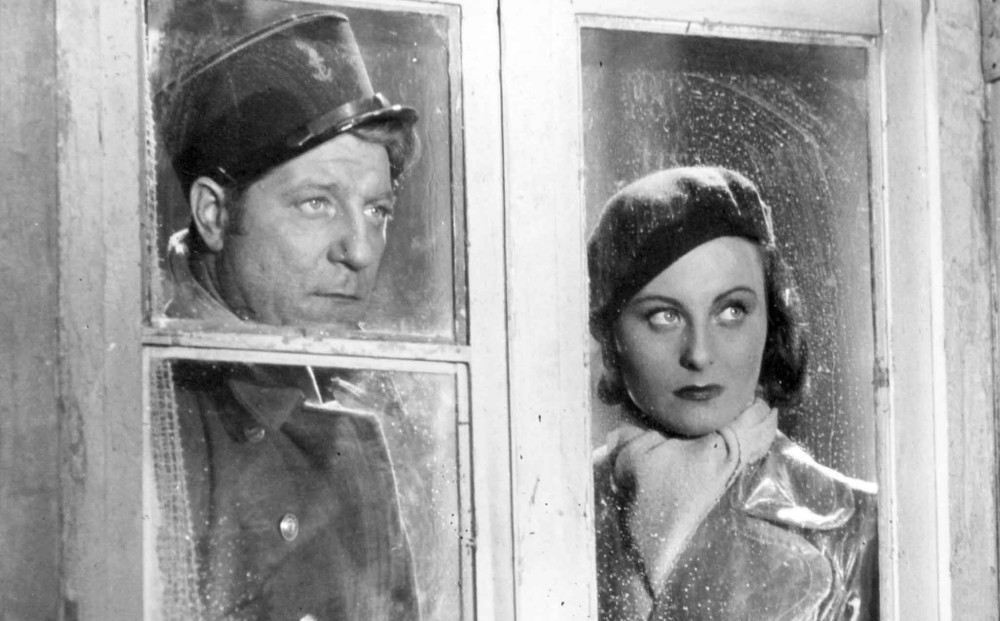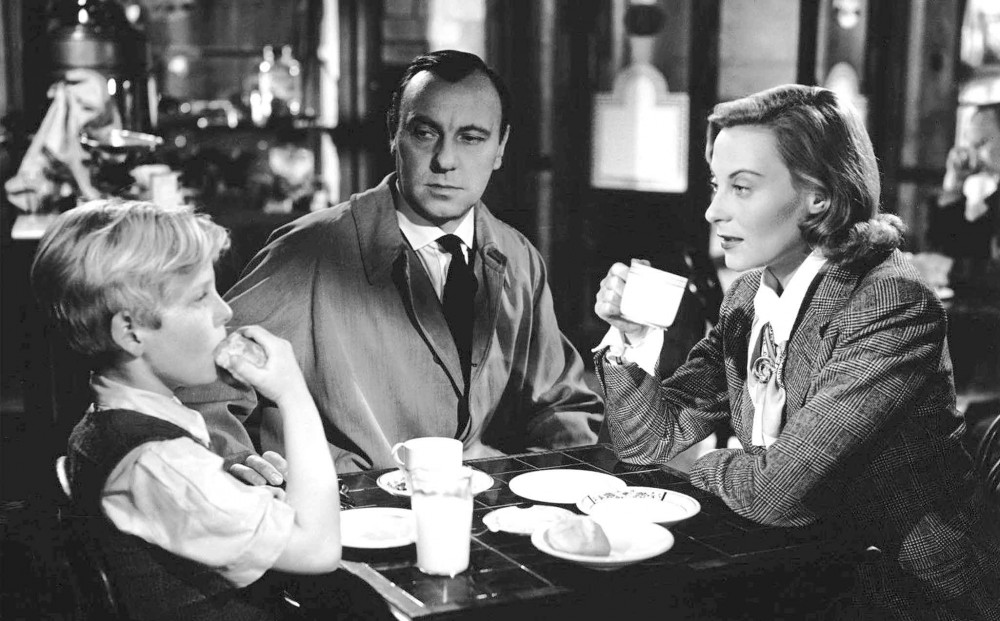THE FALLEN IDOL & PORT OF SHADOWS
Wednesday, August 23
THE FALLEN IDOL
12:30 4:15 8:00
PORT OF SHADOWS
2:25 6:10 9:55
THE FALLEN IDOL
Directed by Carol Reed
Starring Ralph Richardson, Michèle Morgan & Bobby Henrey
(1948) Looks like eight-year-old Phil (Bobby Henrey) will
have his cavernous Belgravia Square Embassy to himself for
the weekend. Dad the ambassador is off to retrieve Mom from
a long hospital stay, so his only companions will be his beloved
pet, MacGregor the snake; his idol, Baines the butler (Ralph Richardson); and his dreaded nemesis, the snake-hating Mrs. Baines (Sonia Dresdel). And when Phil trails Baines
to a tea room tryst with embassy staffer Julie (Gallic legend Michèle Morgan), he becomes the solemn bearer of a Secret. But when an idyllic afternoon at the zoo is topped by a nighttime tragedy, and the soft-spoken police arrive to ask all those polite questions, Phil enters a world of lies that protect, lies that implicate, and eventually, truth that no one listens to. The first collaboration of writer Graham Greene and director Carol Reed (their next: The Third Man) was based on Greene’s story “The Basement Room.” Honored in its time (The New York Film Critics named Reed Best Director and both Reed and Greene were Oscar-nominated), Fallen Idol has tended to get lost as the middle child of Reed’s great “Noir” period (between Odd Man Out and The Third Man). Seen again, it effortlessly combines a sensitive child’s-eye-view of the world with suspense that rivals Hitchcock — just follow the flight of the fateful paper airplane. DCP. Approx. 94 min.
12:30, 4:15, 8:00
“BRILLIANT!”
– Matt Prigge, Metro
“Its vertiginous black-and-white cinematography is every bit [The Third Man]’s equal.”
– Ben Kenigsberg, The New York Times
“SUPERB SUSPENSEFUL ENTERTAINMENT! Stands as one of the great films about looking, about perspective, about the way we watch and interpret not just film plots but each other.”
– Alan Scherstuhl, The Village Voice
“A FILM OF EXCEPTIONAL DISTINCTION!”
– David Lodge, The Guardian (UK)
“ONE OF THE GREATEST MASTERPIECES OF POST-WAR BRITISH CINEMA! A shattering challenge to childhood ideals and an exploration of adult moral complexity.”
– David Parkinson, Empire Magazine (UK)
“REMAINS UNSURPASSED!”
– Anthony Lane, The New Yorker
“One of the brilliant demonstrations of point of view filmmaking…
BLACK–AND–WHITE CINEMA AT ITS PEAK!”
– Andrew Sarris
“YOU WON’T FIND ANYTHING ELSE HALF AS ENTERTAINING”
– Stuart Klawans, The Nation
“Reed captures both [Greene’s] intentions and the child’s panicked isolation in a scene that finds Phillipe fleeing through city streets as steeped in shadow and dread as those in the Noirs of Anthony Mann.”
– Manohla Dargis, The New York Times
“Richardson starts out as an unlikely charmer, doing silent-comedy riffs for the boy’s amusement. Morgan makes seductive melancholy glitter. But Dresdel gives the standout performance as a woman whose bitterness becomes Satanic. The moment when her hairpin drops on Phillip’s pillow is one of the high points of domestic horror.”
– Michael Sragow
PORT OF SHADOWS
Directed by Marcel Carné
With Jean Gabin & Michèle Morgan
(1938) In a lonely flophouse on a spit of land at the edge of Le Havre, outsiders converge: Jean Gabin’s hungry, broke, pugnacious, probably AWOL soldier; mysterious teenager Michèle Morgan in iconic beret and plastic raincoat; cheerfully disillusioned painter Robert Le Vigan; knickknack shopkeeper Michel Simon, proclaiming his honesty and love for sacred music, but sporting one of the cinema’s creepiest beards; and homme dur wannabe Pierre Brasseur, perpetually in search of the missing “Maurice”. Ultimately the choice comes down to a ship out or a continuing pursuit of a sudden love, in the first of the worldwide successes of director Marcel Carné and screenwriter Jacques Prévert (Le Jour se Lève, Children of Paradise, etc…), the archetypal exemplar of pre-war “poetic realism.” DCP. Approx. 91 min.
2:25, 6:10, 9:55
“A remarkably beautiful motion picture.”
– Frank S. Nugent, The New York Times
“Everything in Jacques Prévert’s script is essential—seemingly throwaway lines loop back to revelations, and shoulder shrugs sum up characters—without sacrificing an overarching, undefinable sense of operatic futility. For these outcasts, life is as heavy and elusive as the fog that never abates in this port town; and the film’s greatness arises from its belief in the transcendence of impermanence, in the immortality of fleeting but true affections. From Gabin’s fatigued magnetism to cinematographer Eugène Schüfftan’s woodcut-worthy attention to texture, this is movie melancholia of the very highest order.”
– Eric Hynes, Time Out
“In 1938, no film looked more revolutionary than Port of Shadows. With its opening scene of bedraggled Jean Gabin struggling down a foggy road, the very temperament of French cinema changed.”
– Dudley Andrew
“Jacques Prévert's typically astute script is merely the starting point for one of the most roundly satisfying crime movies of the pre-war years; with its gallery of garrulous low-lifes, Alexandre Trauner's magically evocative sets, the melancholy mists and shadows conveyed by Eugène Schüfftan's camera, Coco Chanel's discreetly stylish costume designs and Maurice Jaubert's haunting score, the film is a wonder of collaborative artistry. The bittersweet atmosphere of fatalistic romanticism is brilliantly sustained by Carné and his cast.”
– Geoff Andrew
“Dark, mysterious and shrouded in sensuous fog that Gabin's character says is part of the emotional weather he carries around with him… The dialogue by Jacques Prévert boasts glorious lines comparable to those in Children of Paradise. Nelly says: ‘Each time the sun rises we think something new will happen.’ Pessimistic, yet strangely sublime.”
– Peter Bradshaw, The Guardian
“Essentially, this is film noir, so there’s crime and romance, but both are submerged beneath a resolutely ground-level exploration of lives in crisis – a mood bolstered by shots of the down-and-dirty French port groaning into action.”
– Dave Calhoun, Time Out (London)
“Carné’s direction is masterful, not only in his handling of the actors, but in the visual suggestiveness he obtains from Schüfttan’s images and from Trauner’s perfect settings. Gabin and Morgan convey a real warmth of love that is rare in Carné’s work. The film expresses so clearly (though unconsciously) the pessimistic mood of France before the 1940 debacle that Vichy spokesmen claimed, ‘If we have lost the war it is because of Port of Shadows.’”
– Georges Sadoul


